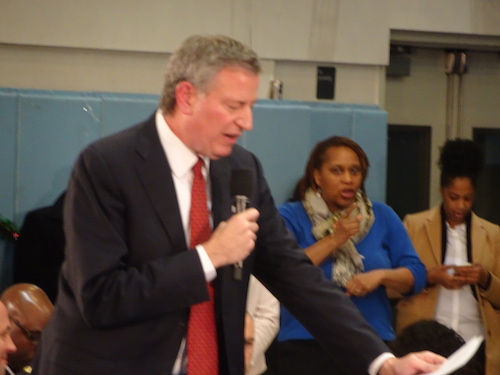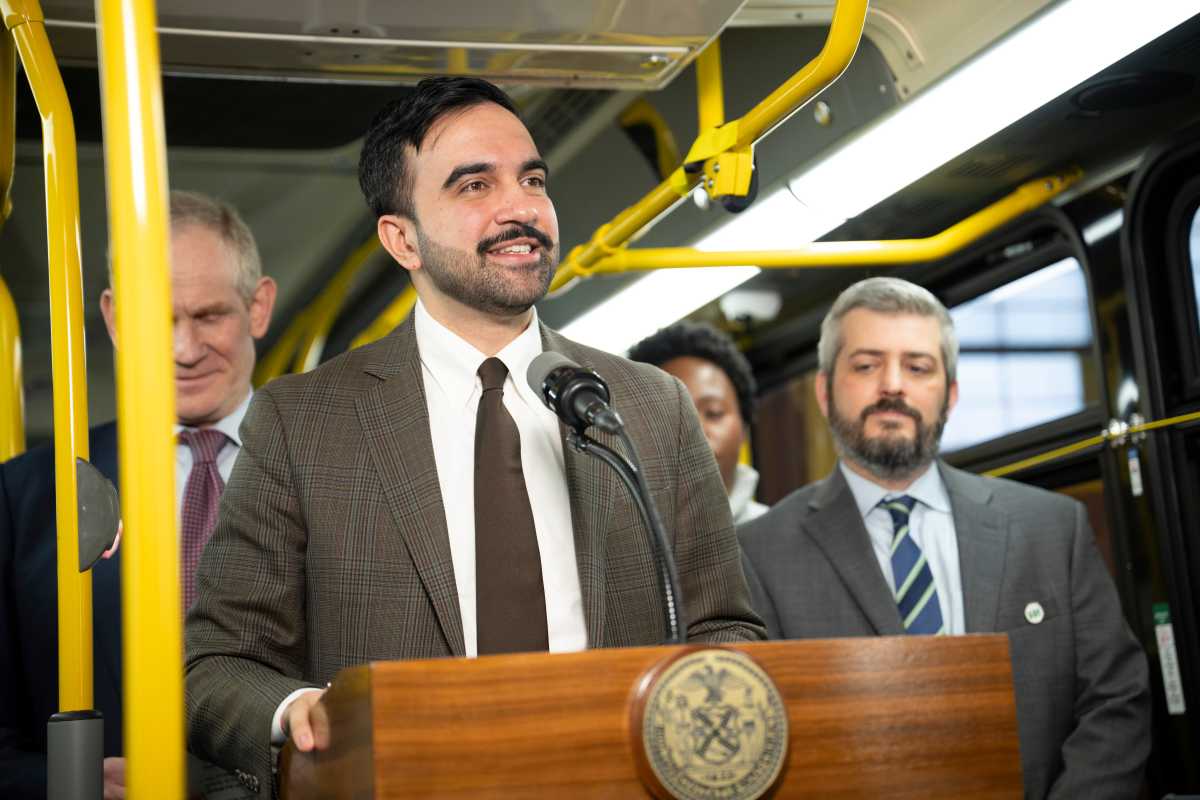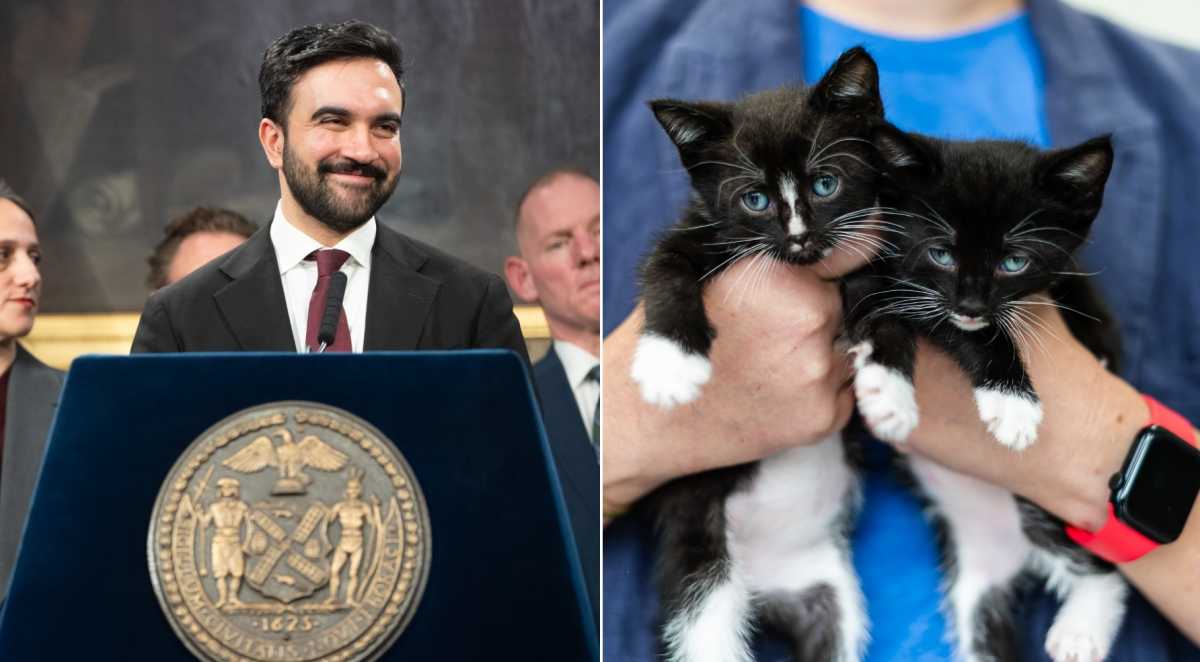Mayor Bill de Blasio said last night he shares concerns about the closing of the W.E.B. DuBois High School in Crown Heights and will look further into keeping it open.
De Blasio spoke on the issue last night at his 50th Town Hall throughout the city, this one that City Councilwoman Laurie Cumbo (D-Fort Greene, Clinton Hill, Prospect Heights, Crown Heights) hosted at the Ingersoll Community Center, 177 Myrtle Avenue in Fort Greene.
Richard Hurley, president of the Crown Heights Community Council, brought up the school’s imminent closing and asked what De Blasio plans to do to save it. The school has no gym and is in the heart of gentrifying Crown Heights, less than 50 feet from the Bedford Union Armory, which is being redeveloped with a state-of-the-art gym for community use.
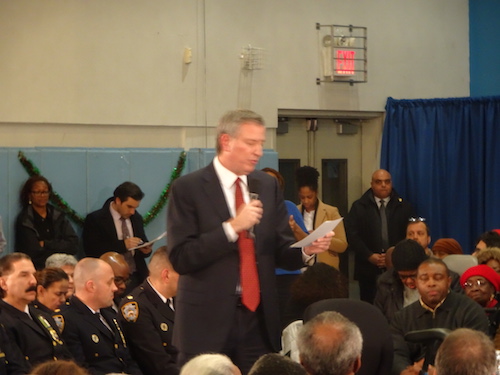
“The problem is that they wanna move that transfer school to a place in Brownsville, where there are already three or four transfer schools,” said Hurley said at the Town Hall. “But we would like you, Mayor De Blasio, to stop the PEP (Panel for Education Policy) vote that’s gonna happen January 24.”
De Blasio pointed out that the closure of DuBois is a symptom of a larger problem – namely, the fact that several of the schools in the borough, transfer and otherwise, are too small to function effectively. Nevertheless, he promised Hurley a followup meeting with the deputy chancellor about the issue, claiming that he cares a great deal about canceling the vote and keeping the school open, due to the historical and cultural significance of the name W.E.B. DuBois.
“The name of W.E.B. DuBois has to be enshrined properly, and not in any way erased from the picture, and we’re trying to figure out how to do that as well,” said de Blasio.
The Town Hall took place to address the most pressing problems – both general and specific – that residents face in the 35th Council District. Several other elected officials accompanied De Blasio and Cumbo, including Public Advocate Letitia James, Brooklyn District Attorney Eric Gonzalez, Assemblyman Walter Mosley and State Sen. Jesse Hamilton.
At the start of the evening, the elected officials took a few minutes to thank the community for showing up, and lauded de Blasio’s accomplishments since taking office in 2013. In particular, they credited him for making structural improvements to NYCHA housing, ending unlawful stop-and-frisk practices, expanding paid family leave and fighting to raise the minimum wage.
“Mayor De Blasio has done some extraordinary things in his four years,” said Cumbo. “These are instrumental and huge gains that the city of New York has certainly benefited from.”
Meanwhile, De Blasio himself took some time to lay out his upcoming plans to address several hot-button issues in the borough, particularly affordable housing, universal pre-K, and the protection of immigrant communities. Most notably, he announced that starting this spring, the NYPD will be expanding the Cure Violence movement to the 88th Precinct, which covers Ingersoll, Farragut and Whitman.
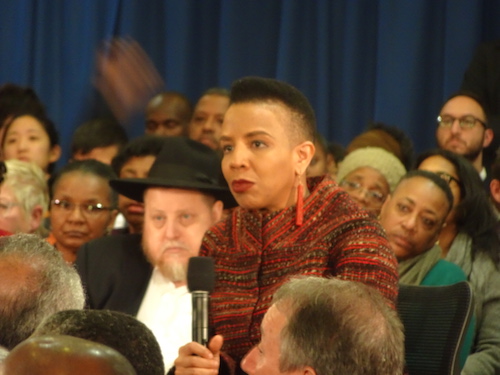
Before the Q&A, Cumbo encouraged attendees to be assertive – but still civil – about voicing their grievances, claiming that the mayor fully intended to hear them out and be receptive to their complaints.
“We’re not gonna be shy, we’re not gonna be bashful, but we are gonna be respectful, and we are gonna voice our opinions in a way that gets our point across,” said Cumbo.
To Cumbo’s satisfaction, the crowd followed her request, posing their questions as requests for help from the De Blasio administration, rather than indictments against his record.
Several of the questions, unsurprisingly, gravitated around affordable housing and the protection of low-income tenants. The first question came from Anthony Sosa, a tenant representative from Ingersoll Houses, who complained that housing authorities at Ingersoll weren’t complying with Section 3 regulations.
“There’s no compliance,” said Sosa. “We’re not getting compliance as far as who we want hired, who’s gonna take our master list… we don’t get nothin’. And I was wondering, why hasn’t the mayor’s office looked into this?”
In response, Mayor De Blasio conceded that the Section 3 program, while fine in theory, is deeply flawed in practice, mostly because there’s no way to enforce it.
“I have said to everyone at NYCHA that I want this to be a priority going forward,” said De Blasio. “I’m not satisfied; I don’t think we’ve done enough. I think there’s been an honest effort to try to increase the amount of hiring, but it’s not enough.”
The following questioners covered a broad spectrum, including a low-income senior citizen facing eviction, a women’s rights advocate calling for equal pay across city agencies, and a concerned parent inquiring about a newly introduced anti-bullying bill.
Mayor De Blasio provided attendees with a “bonus” after the Q&A; any attendees who didn’t have their questions answered were allowed to pose them directly to leaders of key agencies around the cities. More than anything else, De Blasio wanted to get across the message that he and his colleagues were determined to address as many problems as possible within a three-hour time frame.
“These town hall meetings give us an opportunity to really get a lot done,” said De Blasio. “An amazing amount comes out of these town hall meetings. Ideas that the administration acts on, things that we need to understand better, opportunity to clarify our approach to the community… there’s a lot that gets done.”


